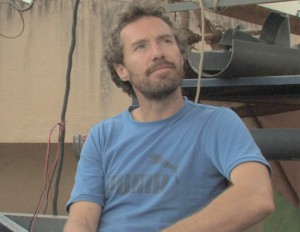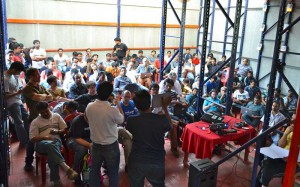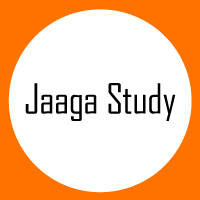



Jaaga is a multidisciplinary, multicultural creative hub built out of pallet racks on a piece of reclaimed land in the center of Bangalore, India, off the MG Road. The cofounders are Freeman Murray, an American techie who sold a web startup to Excite at Home in 2000 and has lived in India since 2005, working on incubator programs like the iaccelerator.org and startupvillage.in; and Archana Prasad, a Bangalore designer with a passion for the local arts community.
Jaaga, a nonprofit, is piloting a one-year computer science education program leveraging MOOC resources with volunteer facilitators in a face to face community setting, with the goal of creating market-ready computer programmers. Enrollment starts in January. Cost is 10,000 Rs a month tuition plus a 10,000 Rs living stipend.
This interview was conducted with Freeman Murray. http://jaaga.in/study

Q: Jaaga is a multidisciplinary space that has hosted all kinds of arts and culture projects. How did you make the decision to move into education?
A: The first few years we were really focused on how art and tech could be used to create interesting thought-provoking pieces of art.
We had this large dramatic space in the center of Bangalore, internet enabled, which is pretty vital and has about 40 people co-working plus thousands coming by for events. So then we were looking at what else we could do to be of service to the local community, and that’s how we started thinking about the tech enabled education stuff.
Also, I’ve run a number of tech incubators in India, and have seen many of the potential founders haven’t had the tech skills they need to really execute their ideas. So I thought about this as a way of building up a group of people with a foundation of technology skills that they could use to start technology businesses, while taking advantage of the revolution in online learning.
Q: Aren’t there a lot of places to study technology in India already?
A: There’s a huge demand for IT training, but India has a shortage of credible programs teaching computer science. Many colleges and vocational institutes offer it, but quality is poor and graduates are often unemployable.
Q: So you turned to the MOOCs?
A: Yes, we’ve hosted a number of study groups for the early MOOCs–
Machine Learning, AI and natural language processing. There was a lot of interest but also a high drop out rate. So we put together a new program, which is more geared towards walking new students through the whole path. This is what we’re promoting now. The first batch will start in January.
Q: What topics are you covering?
A: Javascript, Android, Unix, Databases / SQL, Python and HTML / CSS. We’re mixing and matching best of what’s out there from various MOOC platforms. Basically I want people to be able to develop and deploy a web or mobile application. My end goal is for this to bridge into an incubation program for new businesses.
Q: How are you going to structure the support around the MOOCs?
A: Our model is to have in-person coaches and then to have technical experts available remotely. We’re interested in creating a replicable program that can work in places where there are no local technical experts.
Q: So the coaches don’t have to be experts?
A: No. The coach role is to track the student’s progress, look for problems and then facilitate interactions with the technical experts if someone is stuck. We think having a person like this will help with motivation, like a personal trainer at the gym
Sounds kind of like Sugata Mitra’s granny cloud.
Q: Your program is a full year?
A: There are a number of programming boot-camps in the states that tend to be shorter. I feel India has gotten a bid of a bad rep internationally, so I wanted to make sure our students were solid when they graduate. So we made it a bit longer.
Q: And you’re charging for this class?
A: Yeah, though we’re deferring the cost. We’re asking people to commit to paying 10% of their salary once they get a job after the program completes, until they put two more people through the program. We’re also trying to line up some student loans to cover people’s living expenses.
Q: So you’re in the midst of recruitment now? Your application process is really unique. It asks applicants to create an account on Twitter, LinkedIn, Khan Academy, Codeacademy, Odesk, Paypal and a personal website. It’s almost like a crash course in forming a personal learning network and getting started as an independent learner.
A: Right now we’re trying to get as many applicants as we can. We’d like to get 50 students in our initial batch, and we really want the first batch to be great.
Q: Who is applying?
A: A range, but average age right now I’d say is 20 – 21. We’re seeing a bunch of applicants who are college dropouts, some who didn’t go to college, and
some who went, but didn’t learn anything, etc.
Q: What about diversity?
A: We’ve had a number of potential nonprofit sponsors say they are only interested in supporting women. So if we can close that we’ll be able to provide a living stipend to women. We’ll probably also have coaches who are women and have only women students in their groups.
Q: Anything else to add?
A: Just that we’re interested in connecting with other people who are trying to do what we’re doing. I feel there should emerge over the next few years some best practices around how to support online learners locally.
Posted in Uncategorized |
